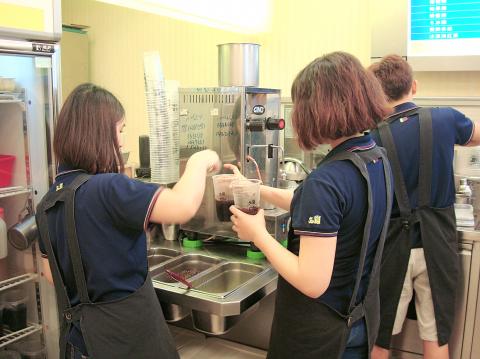Aletheia University said it hopes its application for radio frequency identification (RFID) technology can help alleviate consumer concern over hand-shaken soft drinks, following revelations some chain stores are using mixed tea leaves.
According to school of management professor Hong Chao-fu (洪朝富), there is no question concerning the quality of Taiwanese tea leaves, but the profit made using mixed leaves is too great.
Vietnamese-grown tea leaves cost NT$100 per kilogram, while Taiwanese tea leaves cost NT$3,000 per kilogram, Hong said, adding that mixed leaves have become common due to a lack of certification measures.

Photo courtesy of the Department of Health
Hong said it was during a conversation with an alumnus of the school that the third-party certification concept came into being.
The concept entails using cameras to capture the processing procedure of tea leaves, then uploading the footage to a cloud server, Hong said.
Tea factories working with the project could later put an RFID tag on tea packaging, allowing consumers to access the stored data on the cloud server via the Near Field Communication (NFC) system on smart phones, Hong said.
Tea factories were reluctant to cooperate with the project due to the “secret touch” each factory uses to handle their tea leaves, Hong said, adding that they persuaded owners to try the project as the cameras are set on wide-angle view.
It would be close enough to capture the process of making and packaging tea leaves, but not close enough to capture the secrets of the factories, Hong said.
It took at two days, of ceaseless filming to record an entire process.
Hong said he believed that only by recording an entirely transparent packaging process would the project become credible, adding that he hoped the government would take over the project as it would be more credible.
Chen Ping-kuo (陳屏國), another member of the project said, the RFID tag would include algorithms that would prevent hacking or faking data by asking for confirmation with the cloud server.
Since the tags are linked directly to cloud servers and the team has established a center to monitor all information, any fake data would not show up when the consumer scans the tag, Chen said.
Chen said that compared with QR codes, RFID tags are able to carry more data and are less likely to be forged, adding that the tags would allow a better degree of protection for the quality of Taiwanese tea leaves.
“The project aims to increase the value of Taiwanese tea leaves by at least 20 percent as well as attempting to eradicate the problem of tea factories attempting to mix leaves to maximize profit,” Hong said.
Hong added that the project would also seek to induct students and allow them to gain some practical experience.
Students that have selected courses in practical implementation of e-commerce and the digitization of businesses would be able to participate in the project and visit the tea factories, Hong said.
The project would also induct students from the department of Taiwanese literature in hopes of increasing the project’s cultural creativity, Hong said.
“The project might help the Taiwanese tea industry to pull out from the shadows cast by food security,” he said, adding that the technology could also be used in the production of coffee beans and other produce.

The manufacture of the remaining 28 M1A2T Abrams tanks Taiwan purchased from the US has recently been completed, and they are expected to be delivered within the next one to two months, a source said yesterday. The Ministry of National Defense is arranging cargo ships to transport the tanks to Taiwan as soon as possible, said the source, who is familiar with the matter. The estimated arrival time ranges from late this month to early next month, the source said. The 28 Abrams tanks make up the third and final batch of a total of 108 tanks, valued at about NT$40.5 billion

Two Taiwanese prosecutors were questioned by Chinese security personnel at their hotel during a trip to China’s Henan Province this month, the Mainland Affairs Council (MAC) said yesterday. The officers had personal information on the prosecutors, including “when they were assigned to their posts, their work locations and job titles,” MAC Deputy Minister and spokesman Liang Wen-chieh (梁文傑) said. On top of asking about their agencies and positions, the officers also questioned the prosecutors about the Cross-Strait Joint Crime-Fighting and Judicial Mutual Assistance Agreement, a pact that serves as the framework for Taiwan-China cooperation on combating crime and providing judicial assistance, Liang

A group from the Taiwanese Designers in Australia association yesterday represented Taiwan at the Midsumma Pride March in Melbourne. The march, held in the St. Kilda suburb, is the city’s largest LGBTQIA+ parade and the flagship event of the annual Midsumma Festival. It attracted more than 45,000 spectators who supported the 400 groups and 10,000 marchers that participated this year, the association said. Taiwanese Designers said they organized a team to march for Taiwan this year, joining politicians, government agencies, professionals and community organizations in showing support for LGBTQIA+ people and diverse communities. As the first country in Asia to legalize same-sex

MOTIVES QUESTIONED The PLA considers Xi’s policies toward Taiwan to be driven by personal considerations rather than military assessment, the Epoch Times reports Chinese President Xi Jinping’s (習近平) latest purge of the Chinese People’s Liberation Army (PLA) leadership might have been prompted by the military’s opposition to plans of invading Taiwan, the Epoch Times said. The Chinese military opposes waging war against Taiwan by a large consensus, putting it at odds with Xi’s vision, the Falun Gong-affiliated daily said in a report on Thursday, citing anonymous sources with insight into the PLA’s inner workings. The opposition is not the opinion of a few generals, but a widely shared view among the PLA cadre, the Epoch Times cited them as saying. “Chinese forces know full well that